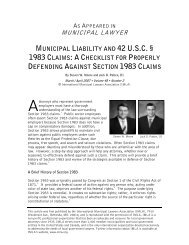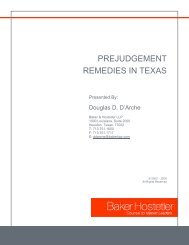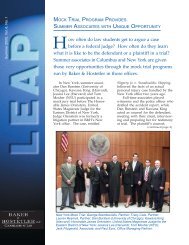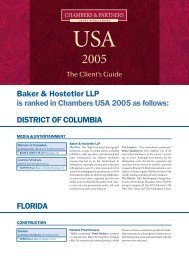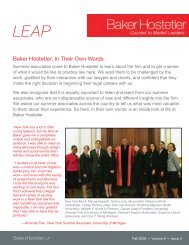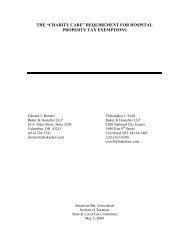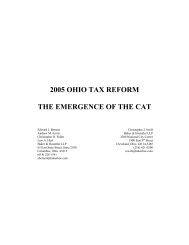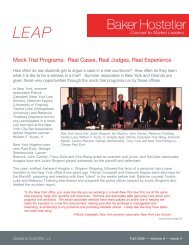Rules Governing Deferral Elections and Payment Options - Baker ...
Rules Governing Deferral Elections and Payment Options - Baker ...
Rules Governing Deferral Elections and Payment Options - Baker ...
Create successful ePaper yourself
Turn your PDF publications into a flip-book with our unique Google optimized e-Paper software.
BAKER & HOSTETLER LLPPerformance-based compensation. In general, compensationis performance-based if it is contingent on meetingpre-established organizational or individual performancegoals over a performance period of 12 months ormore. The initial election to defer performance-basedcompensation must be made no later than six monthsbefore the end of the performance period. In addition, theworker must perform services continuously from at leastthe date on which the performance criteria are establishedthrough the date on which the initial election ismade. Furthermore, no election to defer may be madeafter the compensation has become substantially certainto be paid <strong>and</strong> the amount is readily ascertainable.<strong>Deferral</strong> of fiscal year compensation. If the servicerecipient (referred to as the “employer” here) uses a fiscalyear other than the calendar year, an election to defercompensation that is based on <strong>and</strong> tied to that fiscal yearmay generally be made before the start of the fiscal year.This option is available only for compensation paid afterthe close of the fiscal year(s) during which it is earned. Ifthe performance period covers more than one fiscal year,the election must be made before the first fiscal yearinvolved.Commissions. The service year is deemed to be thetaxable year of the worker in which commission incomeis received. Thus, the initial election to defer commissionincome must be made before the year in which thecommission is to be received. The worker is treated asperforming the services related to renewal commissions(i.e., commissions payable upon receipt of customerpremiums attributable to retained business) in the taxableyear in which the customer pays the additional premium.Final payroll period. Unless the plan provides otherwise,the general rule is that compensation for a payroll periodthat straddles two years (i.e., payable after the last day ofthe service year, but that relates to a pay period thatbegan in the service year) is treated as compensation forservices performed in the subsequent service year. Thisrule does not apply to an amount paid during the finalpay period that relates to services performed during anyperiod other than the final payroll period, such as anannual bonus. An arrangement may be amended byDecember 31, 2006 to provide for differing treatment ofthe compensation (i.e., to deem the final pay amounts torelate to the year in which the pay period began). Ifadopted after December 31, 2006, such an amendmentcannot take effect for 12 months.Non-elective arrangements. Where an arrangementprovides for the deferral of compensation but does notpermit the worker to elect the time or form of payment, orboth, the arrangement must specify the time <strong>and</strong>/or formof payment, as necessary, by the time the worker first hasa legally binding right to the compensation.Forfeitable rights. A worker’s right to compensation isforfeitable if there is a legally binding right to a paymentin a subsequent year, but the worker must provideservices for 12 or more months following the date whenthe right is obtained. For example, restricted stock unitsoften are subject to a requirement that the worker continueto perform services for at least 12 months. To accommodatethe award of such rights mid-year, the initial electionto defer such compensation may be made by the 30 th dayafter the worker obtains a legally binding right to thepayment, provided it is at least 12 months before theearliest date on which the compensation becomes vested.Subsequent Changes in Time or Formof <strong>Payment</strong>In general. A subsequent election to delay payment <strong>and</strong>/or change the form of payment cannot become effective forat least 12 months, <strong>and</strong> must delay the first payment forat least five years from the date on which it wouldotherwise have been made. In addition, subsequentelections with respect to payments to be made at aspecified time or pursuant to a specified schedule must bemade at least 12 months before the first such amount wasscheduled to be paid. <strong>Payment</strong>s made due to disability,death, or unforeseeable emergency are not subject to thesegeneral rules. The new regulations clarify whetheramounts paid in installments are to be treated as one ormore than one payment under these rules.Installment payments. For this purpose, “installmentpayments” must be part of a series of substantially equalperiodic payments that are paid over a predeterminedperiod of years, but are not paid for life. A deferredcompensation plan may treat installment payments aseither the right to a single payment, or the right to a seriesof separate payments. If the installment right is treated asa single payment, the worker can elect to receive theinstallments in a lump sum if the election is made at least12 months before the payments were to commence, <strong>and</strong>the lump sum is paid at least five years after the originalpayment date. If the installment right is treated as a rightto separate payments, the worker may make a separate



